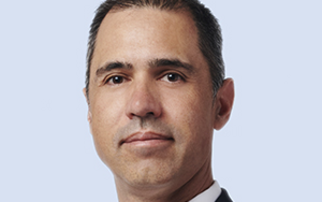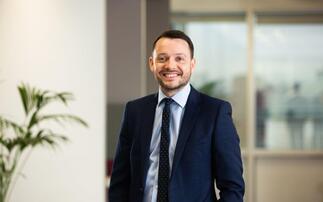Barry Norris is currently ranked the number one fund manager over one and two years by Citywire in the Europe ex UK sector.*
Barry, what are you doing and why?
We’ve just launched the Britannic Argonaut European Alpha Fund, and withBritannic we’re building a boutique specifically focused on European equities.
So this fund that you’re launching how would you describe it; what’sits objective?
This is a fund of best ideas. Our objective is to make money for our investorsboth in terms of dividends and capital returns. Here we’ve got 50 of thebest ideas we can find from all over Europe.
Does it have a benchmark and how important is that benchmark to the way you invest?
It does have a benchmark. The benchmark is Europe MSCI excluding the UK. We’reaware of the benchmark; the benchmark is our index or universe of stocks fromwhich the majority of our ideas are derived. But we don’t let the benchmarkdictate the composition of the portfolio.
So how do you get the composition of the portfolio? Is there a process, a style?
There certainly is a process. We look at a universe of about 800 stocks. We thennarrow that universe down to stocks that we’re interested in for a specificreason. That could be, for example, valuation; valuation can draw us to stock.Why is this company looking so cheap? Then we do our own research on the stocksand if we find that the stocks, the investment rationale stacks up then we putthem into the portfolio.
You say we, isn’t it just you?
No. I work with my partner Oliver Russ. We also have a third member of the team,Jason. Jason is our quant model and we use Jason to identify valuation anomaliesin the big universe of 800 stocks.
And how much external research do you use?
We use third party research as a form of idea generation. But for every investmentwe have we also do our own research and valuation models.
What would be an example from maybe your top ten of your buy discipline?
Well, Europe at the moment is full of companies which have got attractive dividendyields. So the average yield on the market is 3.3% and you get 2% in the bankin Europe at the moment. I’d point to Findexa, which is the Norwegian yellowpages company. Findexa has got a dividend yield of 12% at the moment, and youget 2% for having your money on deposit in the bank in Norway. So we then, thatstock has been highlighted from our propriety screening, Jason, and we then lookat the stock in greater detail, try to work out what’s wrong with the companyfor it to apparently be yielding such a high dividend. And after we’vedone our research on the company, our own valuation model we decided that thisstock is too cheap and we can make quite a lot of money out of it.
And when would you sell? Presumably because you’re limited to sucha focused number of stocks, your least best idea has to be taken out of the fund.Whathave you sold?
That’s one of the reasons why we sell a stock. We certainly operate thatDarwinian approach to fund management, in that if you can only have 50 stocksin your portfolio then for every stock you buy you must sell your least goodidea. There are also two other reasons why we sell a stock. Number one is ifwe’ve bought the stock, the price has run up, the valuation no longer looksso compelling.
And number two?
Well, like everybody, fund managers make mistakes and sometimes your analysishas proved incorrect. So if you’ve bought a stock for one reason and thatreason no longer holds then you’ve got to sell the stock.
In terms of buying stocks in a company, is there a particular indicator thatyou look for?
I think stocks should be cheaper on a number of criteria; price to sales, priceto earnings, price to dividend yield, price to free cash flow, price to book.I have to say at the moment in Europe we’re finding a lot of stocks whichare attractive on their dividend yields. So I would say that is the metric we’refocusing on most at the moment.
How would you describe the current shape of the portfolio? What’sit madeup of?
The portfolio is made up of 48 stocks. The maximum holding is 4% in any one stock,and the minimum is 1%. Our overweight positions are in the energy sector. I firmlybelieve we’re closer to the start than the end in the booming oil and oilstocks. We’ve got a number of stocks which play on the economic growthin new Europe, if you like, on the geographic periphery. And we’ve alsogot a lot of stocks which are high dividend yielders and low P/Es. So I wouldsay overall it’s a portfolio composed of companies which are both cheaperthan the average in the market but also offering faster growth rates.
How would you describe your approach to risk?
I think there are two ways of looking at risk and assessing it. One is at theindividual stock level, and clearly when we put together our valuation modelswe’re trying to assess the chance of capital losses in investing in anyone company. So our bias towards valuation being important means that we tendto avoid companies that are trading at very expensive multiples and there’sa lot of good news in the price. Those are the sort of companies that you canlose a lot of money in. The second way of looking at risk is just in terms ofyour portfolio construction. Clearly there are two things to look at here. Oneis your tracking error, and the tracking error of the fund is between 5% and8%, and the other one is a beta, and that’s all systematic risk. The betaof the fund is just below 1.
Why have you chosen Europe?
Well, I started off in the UK market and I learned a lot from that experience.But in general I think that Europe offers more exciting possibilities, there’sa lot more variety there, and it’s a bigger universe to find stocks tomake money for people.
Small, medium, large cap bias?
Well I like to take that choice out of the hands of investors. We’re amulti cap portfolio, so if we think that small caps are offering better valuethan large caps then we’ll have more of the portfolio in small caps, andvice versa if we think large caps are offering compelling value.
You’ve been seeded with £20million already into this particularfund;any other fund inflows?
We’re pretty confident that the fund will be £50-60million at theend of the first month. We’ve already had indications of big inflows byfund of funds investors and, indeed, other institutions.
Now that’s somewhat unusual, because generally with a new fund people waitfor two or three years to get a track record. Why should they not wait whereyou’re concerned?
Well, I think my track record over the last 2½ years has been excellent,and a lot of the people who are interested in putting money into the new fundeither invested in my previous fund or followed my activities very closely, andso we’ve got a lot of interest just by those investors excited by whatwe’re doing.
So what would you say to people you bring to the party?
Well I think I’ve got good stock-picking skills; I think as a fund manageryou’re always looking for ideas, and certainly what gets me out of bedin the morning is the opportunity to assess a very broad universe of stocks inEurope and try to find money-making ideas for people.
You’re doing this under the Britannic umbrella as such, why have you chosento do it that way? Why haven’t you gone off and done what other peopledo in your circumstances, set up all on their own?
Well, I don’t really want to get involved in the day to day responsibilitiesof running a business, or the duties that are involved in running a fund managementgroup. So I purely look after the investing side of the company but still havean equity stake in the company. So, for example, Britannic provide all the salesand marketing, the legal team, the fund administration team, the IT support.All of those things are something where I don’t have any skills at all,and I’m not looking to be involved in that. So essentially Britannic provideall of the resources that a large fund management company provide and we providethe investment expertise. So it’s a meeting of the best you can get froma boutique and from a large fund management group.
Now you are going to limit the size of the fund, what’s that limitandwhy are you capping it there?*
Yes, I think we’re going to limit the size of the fund at £250million.Obviously we want to make sure that the fund doesn’t get so large thatwe can’t replicate the performance that we have in the past. And clearlythere’s a little bit of finger in the air of where you draw that line.But £250million I think is a good starting point.*
Why should somebody invest with you and why should they invest with you in thisparticular way?
Well, I think Europe is a very cheap market at the moment. This fund is a portfolioof our best ideas in Europe. We think we can make money out of all of the stockswe’re investing in. My track record is extremely good over the last coupleof years, and I think we’re well placed to do that in the future as well.
Barry Norris thank you very much.
Thank you.
* Please note that the fund does not currently operate Limited Issue arrangements.Should these be introduced (to control the size of the fund) all unit holderswill be notified accordingly.
Past performance is not a guide to future performance. The value of units and the income from them can go down as well as up and is not guaranteed.
All the performance is in relation to the Neptune European Opportunities A Fund. The Britannic European Argonaut Alpha Fund is a new fund launched on the 12 May 2005 and has no past performance.
Information and opinions contained in this interview have been compiled or arrived at by Britannic Asset Management Limited. Britannic Asset Management Limited and Asset.tv Ltd accept no liability for any loss arising from the use hereof nor make any representation as to their accuracy or completeness. Any underlying research or analysis has been procured by Britannic Asset Management Limited for its own purposes and may have been acted on by Britannic Asset Management Limited or an associate for its or their own purposes.
Britannic Asset Management is the trading name of Britannic Asset Management Limited group which includes Britannic Fund Managers Limited and Britannic Investment Management Limited. Both companies are authorised and regulated by the Financial Services Authority.











